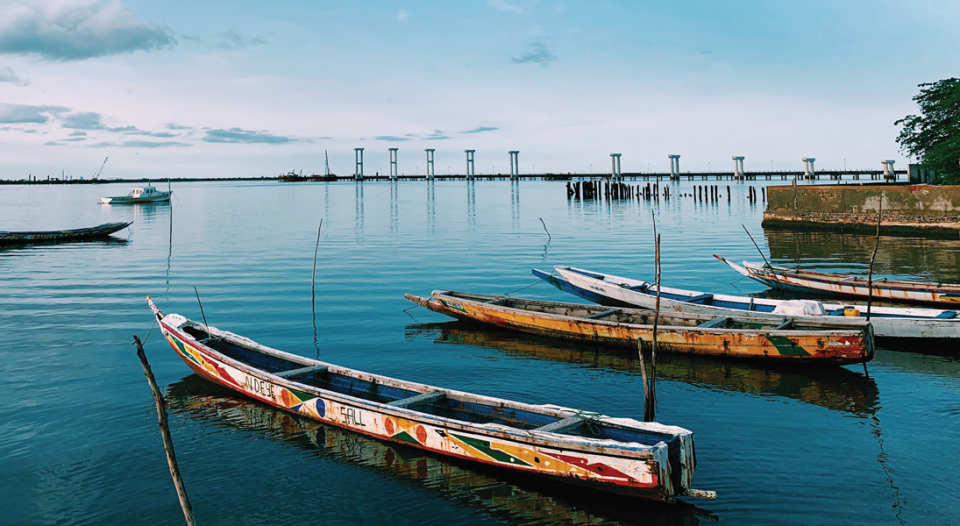Editor’s note: From fall 2019 to spring 2020, the author served with the Lutheran Church of Senegal through the Young Adults in Global Mission (YAGM) program, which is funded in part by Mission Support. The following is adapted from her YAGM blog.
I’ve always had a complicated relationship with water. My family’s home sits where the suburbs meet the rolling foothills of California’s Central Valley, and our neighborhood relies solely on a well.
For decades, well water was abundant. Then the drought of 2011 hit. One by one, my neighbors’ wells went dry. They had no water coming from their faucets, no water to shower, no water to cook or clean. My family cut back on our water usage, but we also had days when there was nothing. After long conversations, we recently decided to dig a new well, which was both expensive and not a guaranteed solution. Luckily, we found water.
The water we use to flush our toilets is often cleaner than much of the drinking water available in developing countries.
Americans have some of the cleanest water in the world, but many of us don’t realize how precious it is. The water we use to flush our toilets, for example, is often cleaner than much of the drinking water available in developing countries.
In Senegal, the majority of the population lacks reliable water access, let alone clean water. I was told that Foundiougne, where I would serve with YAGM, often went several days without water.
Initially, I believed this would be an easy transition, given my experience with wells. That wasn’t the case at all. I experienced a rude awakening in Senegal. Water is a huge privilege.
Water quality and the church
Due to a rapidly changing climate and challenges with resource management, Foundiougne’s water has become contaminated with salt. Though the water that runs through residents’ pipes is still good for cooking, cleaning and bathing, it’s not safe for drinking. This has led residents to search far and wide for this daily necessity or to risk sickness by ingesting contaminated pipe water.
To combat this, the Lutheran Church of Senegal’s Program for Food Security (where I served) and other organizations constructed wells in Foundiougne’s surrounding villages. It’s a good start to addressing the issue, but with less frequent rain, there’s no guarantee how long the well water will last.
Other options include filtration sites and water trucks. My closest site, where I paid to fill up my 10-liter bottles, was a 20-minute car ride away. Most Senegalese live without motor vehicles, so this isn’t a practical solution. Instead they wait for water trucks to make stops in town. Everyone hauls bright yellow jerricans to and from their houses, hoping there will be enough water left in the tanker.
Water access and gender inequality
Finding clean drinking water in Senegal is difficult enough, but drawing water for life’s other necessities presents challenges that most Americans can’t even imagine.
To begin with, indoor pipelines are rare, and most simply don’t function. Instead, households get all their water from a common spout in each compound’s yard, which is usually shared between two or three families. When anyone needs water, they must take their buckets outside to the spout and wait their turn in line.
To avoid several trips throughout the day, my host family would fill all our water buckets at night. I’ve never had to confront how much water I use in a day—this was a real eye-opener.
Another thing I learned is that water goes very quickly. Thus, drawing water was our most important daily chore. Filling buckets can take several hours, depending on how much water is available. After each one is filled, the buckets must then be carried back inside (or up the stairs in my case). These buckets are extremely heavy, and the activity is draining.
It’s time for us to awaken from the ignorance of our water privilege, to realize just how precious this resource is for all of earth’s inhabitants and to protect it for future generations.
At first I saw this as an inconvenience, but there was something else about it that bothered me more deeply. Women and girls are basically the only people burdened with getting buckets, finding water, waiting to fill the containers and carrying them home. In Senegal, the traditional construct of gender is still very strong. Men and boys almost never participate in household chores.
After gathering water and noticing how long it took to do so, I observed a huge loss of opportunity in what is called unpaid labor. Women and girls could better use the time taken to draw water if the labor were distributed equitably among all family members. There would be more time for girls to do their schoolwork and for women to work outside the home, positively benefiting their family’s economy.
This reality shook me to my core, moving me to share it with you. It’s time for us to awaken from the ignorance of our water privilege, to realize just how precious this resource is for all of earth’s inhabitants and to protect it for future generations. It’s time to learn more about, advocate for and fight for water access—and for gender justice.
Take action
Watch “Troubled Water,” an episode of the Netflix documentary Rotten, which explores the bottled water industry in America and the water crisis in Nigeria.
Read The Big Thirst (Free Press, 2012) by Charles Fishman, which delves into the science of water, statistics about our usage, and what the future will look like.
Learn more about ELCA Global Mission at elca.org/globalmission.





